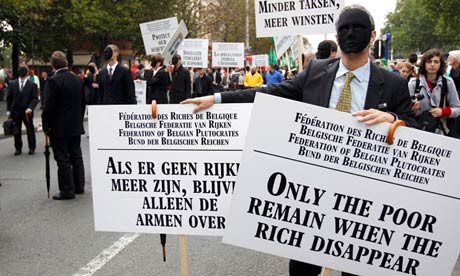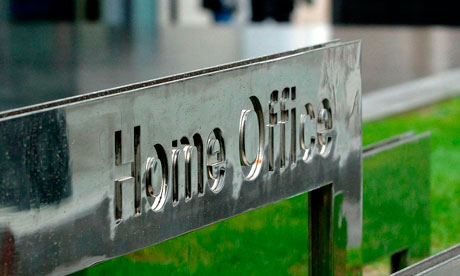Most Britons dislike the European Union. If trade unions don't articulate their concerns, the hard right will

A protest in Brussels. 'Millions of personal tragedies of lost homes, jobs, pensions and services are testament to the sick joke of 'social Europe'.' Photograph: Thierry Roge/Reuters
For years the electorate has overwhelmingly opposed Britain's membership of the European Union – particularly those who work for a living. Yet while movements in other countries that are critical of the EU are led by the left, in Britain they are dominated by the hard right, and working-class concerns are largely ignored.
This is particularly strange when you consider that the EU is largely a Tory neoliberal project. Not only did the Conservative prime minister Edward Heath take Britain into the common market in 1973, but Margaret Thatcher campaigned to stay in it in the 1975 referendum, and was one of the architects of the Single European Act – which gave us the single market, EU militarisation and eventually the struggling euro.
After the Tories dumped the born-again Eurosceptic Thatcher, John Major rammed through the Maastricht treaty and embarked on the disastrous privatisation of our railways using EU directives – a model now set to be rolled out across the continent.
Even now, the majority of David Cameron's Tories will campaign for staying in the EU if we do get the referendum the electorate so clearly wants. And most of the left seems to be lining up alongside them. My union stood in the last European elections under the No2EU-Yes to Democracy coalition, which set out to give working people a voice that had been denied them by the political establishment. We also set out to challenge the rancid politics of the racist British National party, yet the BNP received far more media coverage. Today it is Ukip that is enjoying the media spotlight. Its rightwing Thatcherite rhetoric and assorted cranky hobby horses are a gift to a political establishment that seeks to project a narrow agenda of continued EU membership.
But the reality is that Ukip supports the EU agenda of privatisation, cuts and austerity. Nigel Farage's only problem with this government's assault on our public services is that it doesn't go far enough. Ukip opposes the renationalisation of our rail network as much as any Eurocrat. Yet Ukip has filled the political vacuum created when the Labour party and parts of the trade union movement adopted the position of EU cheerleaders, believing in the myth of "social Europe".
Social EU legislation, which supposedly leads to better working conditions, has not saved one job and is riddled with opt-outs for employers to largely ignore any perceived benefits they may bring to workers. But it is making zero-hour contracts and agency-working the norm while undermining collective bargaining and full-time, secure employment. Meanwhile, 10,000 manufacturing jobs in the East Midlands still hang in the balance because EU law demanded that the crucial Thameslink contract go to Siemens in Germany rather than Bombardier in Derby.
Today, unemployment in the eurozone is at a record 12%. In the countries hit hardest by the "troika" of banks and bureaucrats, youth unemployment tops 60% and the millions of personal tragedies of lost homes, jobs, pensions and services are testament to the sick joke of "social Europe".
The raft of EU treaties are, as Tony Benn once said, nothing more than a cast-iron manifesto for capitalism that demands the chaos of the complete free movement of capital, goods, services and labour. It is clear that Greece, Spain, Cyprus and the rest need investment, not more austerity and savage cuts to essential public services, but, locked in the eurozone, the only option left is exactly that.
What's more, the EU sees the current crisis as an opportunity to speed up its privatisation drive. Mass unemployment and economic decline is a price worth paying in order to impose structural adjustment in favour of monopoly capitalism.
In Britain and across the EU, healthcare, education and every other public service face the same business model of privatisation and fragmentation. Indeed, the clause in the Health and Social Care Act demanding privatisation of every aspect of our NHS was defended by the Lib Dems on the basis of EU competition law.
But governments do not have to carry out such EU policies: they could carry out measures on behalf of those who elect them. That means having democratic control over capital flows, our borders and the future of our economy for the benefit of everyone.
The only rational course to take is to leave the EU so that elected governments regain the democratic power to decide matters on behalf of the people they serve.


